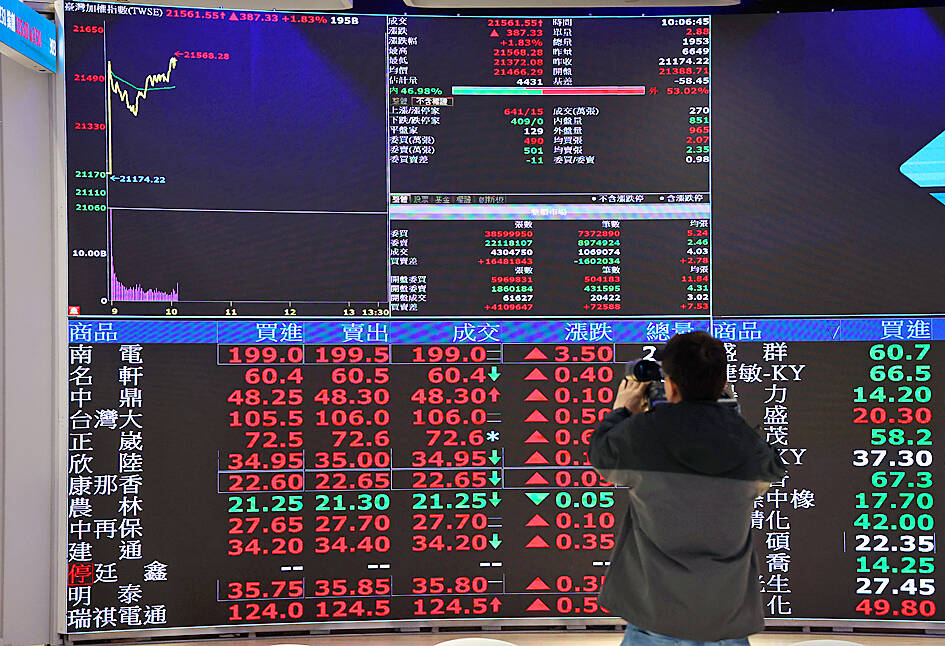Foreign funds snapped a two-month selling streak of Taiwanese equities last month amid renewed optimism around artificial intelligence (AI).
Overseas investors bought US$2.7 billion of Taiwanese shares, according to Bloomberg-compiled data.
That is a turnaround from when they sold stocks in March and April as Taiwan Semiconductor Manufacturing Co (TSMC, 台積電) cautioned over persistent weakness in consumer markets and funds rotated to rival South Korea.

Photo: CNA
Sentiment in chip stocks has recovered globally following another bullish forecast from AI chipmaker Nvidia Corp. Taiwan’s dominant position in the AI value chain would get another boost this week as tech giants gather for the nation’s annual electronics showcase event, Computex Taipei.
“Alongside Nvidia’s optimism, there was some cautious positioning on Taiwan earlier in the year which has eased,” Bloomberg Intelligence strategist Marvin Chen said. “While valuations are getting stretched, Taiwan is still Asia’s best proxy for the AI boom.”
Taiwan was the biggest recipient of foreign inflows last month among emerging Asian countries excluding China. That helped fuel a rally in TAIEX to a record high late last month and pushed the benchmark index to become one of the best performers in Asia this year.
Yesterday, the TAIEX moved sharply higher amid enthusiasm over AI development after a speech by Nvidia CEO Jensen Huang (黃仁勳) in Taipei a day earlier. The index closed up 362.54 points, or 1.71 percent, at 21,536.76.
TSMC, which is believed to provide advanced chips for Nvidia’s graphics processing units, led the gains throughout the session and closed 3.05 percent higher at NT$846.
Turnover on the main board totaled NT$433.32 billion (US$13.38 billion) yesterday, with foreign institutional investors buying a net NT$2.9 billion in shares, Taiwan Stock Exchange data showed.
There is still scope for global funds to keep buying given that foreign ownership of TSMC — the largest stock on the index with a weighting of 32 percent — is below the record 80 percent level seen in 2017.
A strong earnings outlook for Taiwanese firms also bodes well for foreign flows into the market. The 12-month forward profit estimate for the TAIEX has risen by more than 8 percent this year compared with little change on the MSCI Asia Pacific Index, data compiled by Bloomberg showed.
A delay in the US Federal Reserve’s rate cuts might still dent the tech rally, while any escalation in cross-strait tensions might deter foreign interest in Taiwan’s stock market.
“Strength of Nvidia and the underlying AI/server theme continue to support associated stocks in Taiwan,” Robeco Hong Kong Ltd Asia Pacific equities head Joshua Crabb said.
Stocks also remain attractive to foreign investors as they “are a lot cheaper than US counterparts,” he added.
Additional reporting by CNA

The US dollar was trading at NT$29.7 at 10am today on the Taipei Foreign Exchange, as the New Taiwan dollar gained NT$1.364 from the previous close last week. The NT dollar continued to rise today, after surging 3.07 percent on Friday. After opening at NT$30.91, the NT dollar gained more than NT$1 in just 15 minutes, briefly passing the NT$30 mark. Before the US Department of the Treasury's semi-annual currency report came out, expectations that the NT dollar would keep rising were already building. The NT dollar on Friday closed at NT$31.064, up by NT$0.953 — a 3.07 percent single-day gain. Today,

‘SHORT TERM’: The local currency would likely remain strong in the near term, driven by anticipated US trade pressure, capital inflows and expectations of a US Fed rate cut The US dollar is expected to fall below NT$30 in the near term, as traders anticipate increased pressure from Washington for Taiwan to allow the New Taiwan dollar to appreciate, Cathay United Bank (國泰世華銀行) chief economist Lin Chi-chao (林啟超) said. Following a sharp drop in the greenback against the NT dollar on Friday, Lin told the Central News Agency that the local currency is likely to remain strong in the short term, driven in part by market psychology surrounding anticipated US policy pressure. On Friday, the US dollar fell NT$0.953, or 3.07 percent, closing at NT$31.064 — its lowest level since Jan.

Hong Kong authorities ramped up sales of the local dollar as the greenback’s slide threatened the foreign-exchange peg. The Hong Kong Monetary Authority (HKMA) sold a record HK$60.5 billion (US$7.8 billion) of the city’s currency, according to an alert sent on its Bloomberg page yesterday in Asia, after it tested the upper end of its trading band. That added to the HK$56.1 billion of sales versus the greenback since Friday. The rapid intervention signals efforts from the city’s authorities to limit the local currency’s moves within its HK$7.75 to HK$7.85 per US dollar trading band. Heavy sales of the local dollar by

The Financial Supervisory Commission (FSC) yesterday met with some of the nation’s largest insurance companies as a skyrocketing New Taiwan dollar piles pressure on their hundreds of billions of dollars in US bond investments. The commission has asked some life insurance firms, among the biggest Asian holders of US debt, to discuss how the rapidly strengthening NT dollar has impacted their operations, people familiar with the matter said. The meeting took place as the NT dollar jumped as much as 5 percent yesterday, its biggest intraday gain in more than three decades. The local currency surged as exporters rushed to